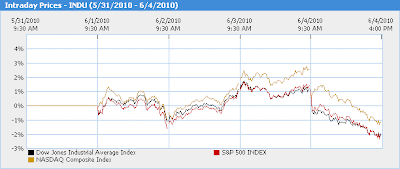The markets showed some strength early in the week, only to fall considerably on Friday after a discouraging unemployment report. At the close, the Dow lost 2.0%, the S&P lost 2.3%, and the Nasdaq was lower by 1.7%. Oil dropped 3.5% this week, while gold continued to climb higher.
Source: MSN Moneycentral
Despite record losses in May, the market looked like it was beginning to bottom last week. Volatility remained high, but the freefall had subsided. Through Thursday of this week, we believed this trend was continuing as the markets were slowly moving upward. The unemployment report released Friday morning came in significantly below expectations and sent the market sharply lower. Although over 430,000 jobs were added last month, 411,000 of those were temporary Census workers. The unemployment rate fell from 9.9% to 9.7%, but the lower rate is due to the fewer workers being counted in the survey. The news resulted in over 3% losses for the major indices and dampened our hopes for a market bottom.
The disappointing employment report has raised a bigger concern: are government policy missteps beginning to take their toll on the economy? The low interest rates, increased entitlements, and hundreds of billions in stimulus pumped into the economy fueled the rise in the market over the past year. However, the lack of results is causing people to wonder if the cost was worth it. The deficit has soared to record levels, while new taxes and other tax increases have investors worried. The growth in government is slowly crowding out the private sector.
Some of us have been critical since the policies were announced, but opponents are growing in number and becoming more vocal. Historically, these Keynesian spending policies have been proven ineffective, yet the government has doubled down and issued new stimulus measures. We are worried that these policies are continuing down the wrong path and may cause even more harm than good. Unless a more free-market approach with reduced tax burdens and smaller government is implemented, the economy may continue to flounder for years to come.
With all this bad news, we have noticed some encouraging signs. Wal-Mart announced a plan to repurchase $15 billion in their shares. Companies do this when they think the share price is undervalued and look to take advantage before it rises again. Next, insider buying has risen to new high levels. Similar to the news from Wal-Mart, insiders purchase shares when they believe the price is too low. While following insiders is not a foolproof plan since no one knows what the future share price will be, it serves as one of many indicators we look at for direction. Finally, these lower oil prices result in lower prices at the pump, an obvious benefit for consumers. It might be scary out there, but it may not be as bleak as it seems.
Next Week
With the sharp sell-off Friday, we will be anxious to see how the market behaves next week. There are a few economic reports to be released, but none important enough to impact the market in the same manner as the unemployment report. Consumer credit will be released on Monday, while inventories, trade balance, and retail sales will be released later in the week. Global issues continue to weigh on the market, so we will be closely watching for any new developments since new global problems seem to arise daily.
Where are we investing now?
Corporate bonds and bond funds are looking like the least-scary investment choice at this time. For stocks, we continue to be cautious on the market and remain on the sideline. We do believe there are undervalued stocks out there, but are in no rush to begin buying. Our big-picture outlook still remains the same, as we are still optimistic through the end of the year since these easy money and stimulative measures will continue push the markets higher. As mentioned earlier, the costs involved in these actions are beginning to cause concern for investors. The higher interest rates, higher taxes, increasing government involvement in the private sector, and a still-high unemployment rate have us worried for the longer term.
In equities, we would focus on higher-quality and multi-national stocks, but some smaller stocks look promising, as well. We continue to avoid banking and insurance sector stocks, and new government regulations have us staying out of oil companies. TIPs are important as we expect inflation to increase in the future, while

